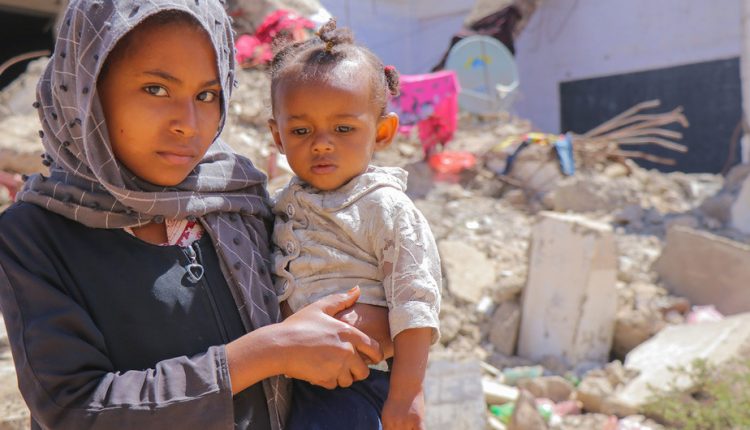UN envoy urges Yemen’s warring parties to place ‘a firm bet on peace’, as famine threat continues
The plight of Yemenis demands “nothing less than a firm bet on peace”, the UN Special Envoy told the Security Council on Wednesday.
The country is “not for the first time” at “a point of decision”, Martin Griffiths said via videoconference, urging an end to “the shooting war, opening up the country and resuming the search for an inclusive political solution”.
Despite a relative calm, he pointed to “rumors” that violence might soon be on the rise, and hoped that “flare-ups” do not herald a return to more widespread violence across the country.
‘Painstaking’ peace process
Mr. Griffiths told ambassadors that for “many months”, he has been mediating the “painstaking process” of negotiating text for the Joint Declaration, through virtual discussions and, when practical, shuttling between the parties.
Although the opposing forces have remained engaged throughout the mediation, he indicated that challenges were cyclical, especially involving, “economic and humanitarian measures”.
The UN envoy reminded that he is the mediator, “not the negotiator” and that the parties must reach a deal with each other, upholding that “only serious and deliberate commitments by their leaders can bring this conflict to a close”.
“It is now time for them to take the final decisions required to bring the negotiations on the Joint Declaration to fruition”, Mr. Griffiths spelled out, referring to a pact that includes a nationwide ceasefire, specific measures to improve the lives of Yemenis, and the resumption of the political process to reach a lasting peace.
Against the backdrop of prisoner releases, in which the two sides were able “to meet and successfully to produce a result that gave hope to so many Yemenis”, the UN envoy believed that this same opportunity for the parties to explain their positions and “together…reach the compromises needed” would be useful.
Yemenis ‘being starved’: Lowcock
In his briefing, UN humanitarian relief coordinator Mark Lowcock said Yemen’s most urgent task, was “to prevent widespread famine”.
He cited the weakened state of those many Yemenis, painting a picture of people with little resistance to diseases, and bodies that are so degraded they “devour” their own organs.
“Yemenis are not ‘going hungry’. They are being starved”, he attested. “All of us – parties to the conflict, Security Council members, donors, humanitarian organizations and others – should do everything we can to stop this. Time is running out”.
Mr. Lowcock said that full access to Hudaydah and other ports, where the majority of exported food and aid is received, together with a lasting ceasefire, are needed to reverse “the slide towards famine”.
He updated that only 45 per cent of funding requirements had been secured in 2020 with grave implications for food and health services access.
Aid money is “the quickest and most efficient way to support famine prevention efforts right now”, he signaled, imploring donors to “fulfil outstanding pledges and to increase their support”.
Turning to the abandoned Safer oil tanker, which sprung a leak in late May and threatens to spill more than a million barrels of crude oil into the Red Sea, the UN relief chief said that “official approval for the assessment and initial repair mission” has not been forthcoming, but that “the Ansar Allah authorities” – more commonly known as the Houthi movement, which are fighting the internationally recognized Government for control of the country – continue to indicate that it will be.
‘Countdown to catastrophe’
Executive Director of the World Food Programme (WFP) David Beasley, said a “countdown to catastrophe” was now underway, detailing that misery on a “whole new level” is only months away.
“We sounded the alarm” in 2018 and 2019, briefing the Council in almost “the same dog-and-pony show”, he said, adding that “quite frankly their suffering is even more pitiful” now.
Mr. Beasley added that the decline in value of the local currency was making provisions even more expensive.
Noting that WFP had pulled Yemen back from the brink of famine before, he said that the threat is once again “knocking on the door”.
Explaining that obstructions to access were diminishing the confidence of donors, the UN official flagged Yemen’s needs and said that access “games” must stop, advocating for currency stabilization to help increase food availability and grow humanitarian donor confidence.
Flashing red lights
He said the lights were flashing “as red as red can be”, and appealed for higher levels of cooperation, a “comprehensive, funded plan,” and a complete silencing of the guns.
“Let me say this very clearly – to avert famine for 2021, we will need $1.9 billion” the WFP chief stressed, adding that “we can’t nickel and dime this to death. We have got to move now and people are going to die if we don’t”.
In closing, he urged Council members not to turn their backs on the people of Yemen, but to “seize this brief opportunity that we have to avoid the famine which is already gaining a foothold…the little boys and little girls, the families, the women – they’re looking to us to save them”.
Protect biodiversity
Meanwhile, Omer Badokhon, founder and Executive Director of the civil society initiative Solutions for Sustainable Societies, maintained that the longer the war continues, the further Yemen will be “set back” in terms of creating a sustainable “green” economy with youth leadership.
He urged conflict parties to stop “harming our biodiversity” and exploiting what has become an increasingly fragile and threatened environment.

